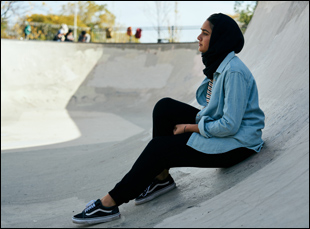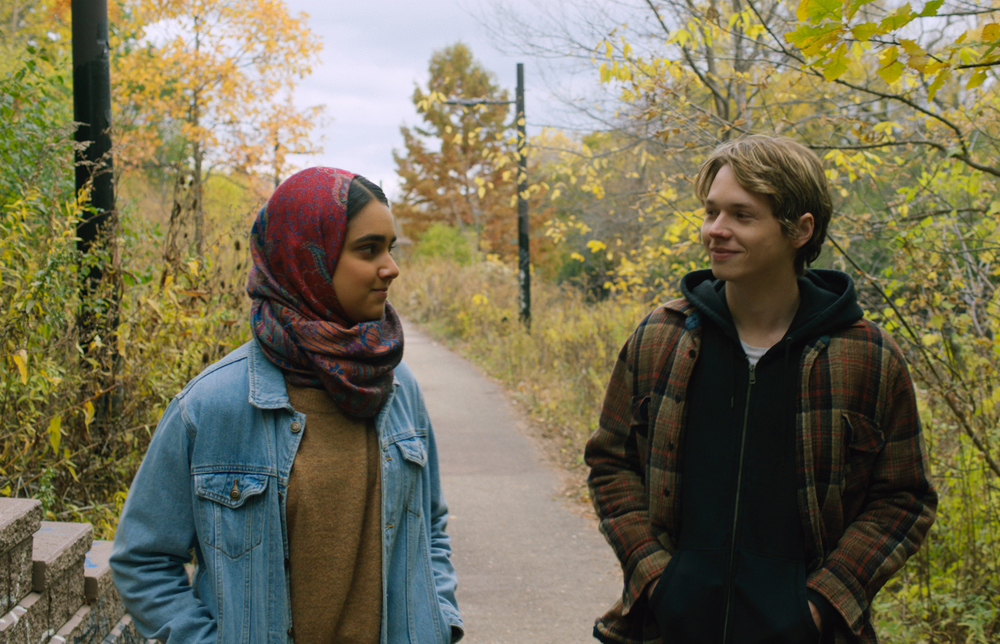Even before you can see the young woman at the center of “Hala,” you can hear the symphony inside of her, with the string section of an orchestra warming up shortly before the opening credits of Minhal Baig’s splendid drama even start to roll. Already in tune, there isn’t the messiness of finding the right keys to play in when those already have been well-established for the Pakistani-American teen (Geraldine Viswanathan) who has been encouraged to assimilate in her adopted hometown of Chicago while still abiding by the strictures of her family’s Muslim faith, but there is the anticipatory fervor of being on the edge of something new and the search to find harmony as the confluences of violins, cellos and violas begins to take shape, and when composer Mandy Hoffman thought about upping the ante by introducing other instruments into the mix, Baig knew she already had found such a graceful way to convey to complexity of impulses that resided within her heroine.
“One of my biggest things was telling Mandy ‘No piano,’ because she loves piano and I was like, ‘No, we’re not doing that,’ laughs Baig, who found throughout the film that she could take out dialogue when Hoffman’s music could say so much. “There was one piece of score that launched everything else and it was the score that we have playing over Hala in the bus when she’s riding [to school]. That scene at the beginning had a bunch of people talking, and then it was just on Hala, on [her classmate] Jesse, and it was the score and that was it. Once we had the cut of it, I gave it to Mandy and Mandy turned around this beautiful swelling score that perfectly captures what she’s feeling in the inside. The sound took on a psychological quality.”
Hoffman’s notes often attach themselves to a character rather than the story they find themselves in, able to access thoughts and emotions that are felt so deeply they may have become imperceptible to the person having them but seem to radiate from their very soul. It was this sensitivity that led Baig to seek out the composer after hearing her work in “The Lovers,” a stealth contender for one of the finest film music of the century so far. Perfectly acknowledging the ridiculous and sublime inherent in Azazel Jacobs’ comedy about a married couple (Debra Winger and Tracy Letts) who become bored with the affairs they’re having and turn to each other for a renewed spark, Hoffman’s bold, stirring score arrives in waves, threatening to overwhelm the duo at its center who you wouldn’t know could be capable of such big emotions in their relatively humdrum lives, with their passion exploding into majestic crescendos.
In the case of “Hala,” Hoffman’s music is nimble, graceful and precise where the string section follows the footsteps of the film’s lead in every hopeful stride forward and each timid retreat as one elegant movement that can be experienced as progress even when there are setbacks, an exquisite evocation of coming into one’s own, particularly when there can be so much strength to be drawn on from a rich cultural identity as well as so much that can get in the way of developing a distinct persona away from it. After premiering earlier this year at the Sundance Film Festival, “Hala” recently became the first narrative film to debut on AppleTV+ where it is now streaming, and Hoffman spoke about how composing for film unlocked her musical prowess, her collaborations with Jacobs and Baig and tuning into experiences her characters have and transforming them into new ones for an audience.

It is. The actor’s performance is huge for me and I think some composers like to write to the script and have these themes out, but I really riff off the actors a lot. [For “Hala”] I was brought in on the script [stage], and [Minhal] really planned out the photography and she kind of clued me in [during the process], but I like coming in at the end. I feel like music is such a finishing thing, unless it’s written in as part of a character, so I really started working when I saw the footage.
For the rhythm of this film, I really riffed off of [Hala’s] poetry – there’s a voiceover for it and the whole thing started when she’s taking a walk with Jesse in the woods, after they see the library and they’re telling poetry to each other. That whole idea of this rhythm of starting and stopping – there’s even a line in the Anne Carson poem [she quotes], [about how] it begins to push you and then it pulls you – the whole concept of the score came from that.
You actually create that feeling in a sense with your use of both a string quartet and a 30-piece orchestra. Where did the inspiration for that come from?
Part of it was due to the budget and the schedule was super tight on this. That was the biggest challenge of the project. We originally thought we were going to have a bigger budget for the score and then it turns out we didn’t, so we had decided at that point to do strings and I had to ship out the orchestra to a remote location. I wouldn’t be able to be there, and [for] some of these passages, like the arpeggios and the melodies, I just wanted to be there, so I recorded the score fully in a remote location and then fully in New York where I live, with a quartet [because] sometimes I wanted like a more intimate, present sound of the quartet. And then the mixer and I had this Idea, sometimes within the same cue, to push the orchestra forward and then pull it back for a moment where it’s just the quartet, so a cue could swell bigger with the orchestra pushing forward again. But the main melodies I kept on the quartet. Probably you wouldn’t even notice it, but I notice it. [laughs]
Did it seem like a practical solution to a creative problem when you have this character with these repressed emotions?
A lot of the things that I was feeling with the character, they weren’t so in the front of my brain, if that makes any sense. I was just feeling [Hala] more than thinking about what she was feeling. It was more of an auditory thing of the poetry and [having] that rhythm and I can relate to being a teenage girl and struggling with life. I thought [Hala] was an extremely relatable character, so between the poetry and the performances – Geraldine’s performance is so amazing that a lot of times we just chose to stay out of the way, that I really didn’t score many other scenes that Hala wasn’t in, but she’s pretty much in every scene of the film.
What were your early conversations with Minhal about?
Minhal had seen “The Lovers,” and she knew one of the producers and I guess she liked my sensibilities towards the project, but obviously, it’s a very different score than “Hala” and when she first brought me on, I assumed that she wanted that, but I quickly realized that wasn’t right for this project, so I was throwing things at Minhal and seeing what she responded to. She really made it clear from the beginning that this was going to be a quiet film.
Given the way the camerawork is in the film, how much did you want the intensity of the sound to counterbalance the distance in relation to where Hala was with the camera?
Definitely. Besides actors, I riff off photography too, and for the more wide shots or kickbacks, I could bring in something with more strings, but
[like when] we’re on the bus and there’s a push-in that’s like a zoom that’s going into her crush [Jesse], I knew that we had to be inside of her head because of the way the camera was moving. I had to write something that was psychological for that piece. I [was actually] trying to work out this one scene and failing and eventually I put it down and moved to [that] scene and I decided to use those quartet sounds. It’s there we found our sound and then the next cue where they’re walking out of the library into the park with the poetry. After that, I think I wrote [the rest of the score] in a week or something.
This is a more general question, but was it interesting to start thinking about music in a narrative way when you first began composing or was it an adjustment?
It was very natural for me because I always struggled with music until I found film scoring, to be honest. I really wanted to be a writer when I was growing up, like an author, so here I was combining the two and I took film classes at NYU – it was all my worlds coming together. Music by itself can kind of be without a film or something to associate it to can be a little overwhelming to me. When I used to live in L.A. and I knew Azazel [Jacobs] from the neighborhood – we had a lot of friends in common [since] I knew a bunch of people going to school at AFI where he was in grad school. He found out I was starting to think about film music, going to study to prepare for it, and so we did a film called “The Good Times Kid” together that was actually his first time working with a composer and my first project ever. It’s still one of my favorite scores I’ve ever done, though I wouldn’t do a lot of that stuff now.
“The Lovers” is radically different, but the score is every bit as defining stylistically.
Yeah, “The Lovers,” I don’t think he had planned to do that film without any score and then to go do a 180. We both love the Nouvelle Vague. I think that’s what draws us together, like pulling that sound from the French New Wave for those big moments. For “The Lovers,” there’s this tree that [becomes] this character in the film and [the titular lovers are seen] being coy around the tree, and I was like, “Oh, I see what you’re doing with this tree.” Some other people might’ve missed it, but my dad was a big French film fanatic, so I got it immediately.
For “Hala,” what was it like seeing your score on the final film?
What was interesting was at Sundance, we were all sitting together with the [producers from] Overbrook, who were absolutely amazing to work with, and everyone was just so pumped about the film. It was really nice to see when they make all these huge-budget films how much they believed in it and we actually finished the film a while ago – we weren’t in that mad Sundance rush, so I had some distance. Usually when I see a film I’ve scored, it’s pretty soon after I finish it, so I have more of a nervousness to it and this time, I had already heard my score and lived with whatever mistakes I thought there were because that’s always the hardest thing about seeing film is “Oh God, I wish I could change that.” So I was really able to watch it with fresh eyes and it really moved me and I cried. I was embarrassed, but I cried a lot. [laughs]




